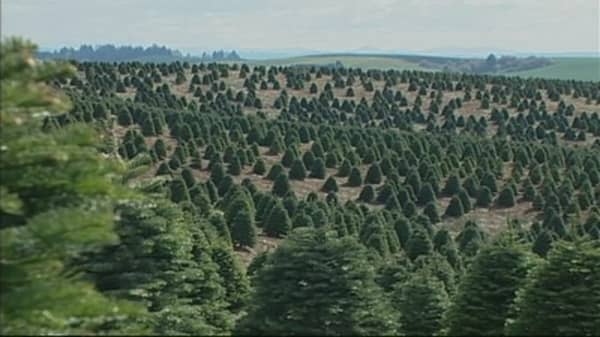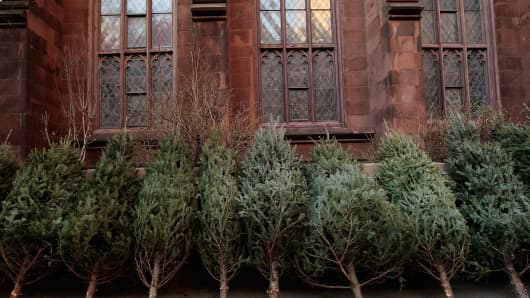Oregon, the largest Christmas tree producer in the country, has seen 160 growers leave the business since 2008, a 19 percent drop.
"Sales have been going down, and prices likewise, so that's a pretty tough combination to beat when you're a producer on a long-term product like this," said Jim Heater of Silver Mountain Christmas Trees.
Facing declining sales and competition from China, the industry banded together a few years ago to apply for a USDA "checkoff" program to raise money for promotion, education, and research. Under the program, growers with at least 500 trees would pay fifteen cents for every tree sold, a cost the growers could take out of their own profits or pass along to retailers.
Checkoff programs have been around for years. They've been used to promote things like eating beef ("It's What's for Dinner"), dairy ("Got Milk?"), and cotton ("The Fabric of Our Lives"). The USDA approves and oversees the programs to make sure producers pay and to monitor results.
In November 2011, the USDA approved a checkoff program for the Christmas tree industry, but it never went into effect. A blogger labeled it the "Obama Christmas Tree Tax," and the program was immediately put on hold.
(Read More: Bad News at the Grill as Beef Prices Hit All-Time High)
Eighteen months and two Christmases later, it's still on hold with no end in sight.
The White House did not respond to our requests for comment on why it's in limbo. Representatives from states with sizeable Christmas tree operations are furious.
"They don't call it a Hamburger Tax, they don't call it the Shirt Tax," said Rep. Kurt Schrader, a Democrat from Oregon, when comparing the tree checkoff program to those for beef and cotton. "This is a way for the industry to self-promote their own products, and, frankly, if you are interested in American jobs and American industry, you want the industry to be able to promote themselves."
He is threatening to legislate the funding program if the White House doesn't let it happen. "The Department of Agriculture has said this is fine," Schrader said. "I personally called the White House to say, 'Hey, come on, get real here.'"
Grower Betty Malone winces at characterizing the checkoff program as a tax, "because it comes from the growers and goes to the growers." Voluntary programs in the past have petered out without raising much money.
She would like to see some of the money used to research solutions to problems like needles falling off trees soon after they're cut. "What if we could figure out how we can keep the needles on the trees for two months, or how to keep the trees green for months at a time after they've been cut? Those are the things that we might be able to do with this kind of a program."
(Read More: Investors Get Into Juice, Hoping to Squeeze Profits)
In the meantime, growers wait and watch business die off. Silver Mountain's Heater said consumers, even when they do buy live trees, are choosing smaller ones.
"Here we have an industry that's feeding a lot of people, we hire a lot of people, it's local," Heater said. He added, the industry has jumped through every hoop the government placed before it to get a checkoff program going. "We are doing everything we can to be right with this, and we're not making any headway."





